- Animal Person
- Holden After and Before
- Parasitic Oscillations
- Helpmeet
- The Sleeping Car Porter
- Lost in the Valley of Death
- In the City of Pigs
- Hotline
- The Next Age of Uncertainty
- Hail, The Invisible Watchman
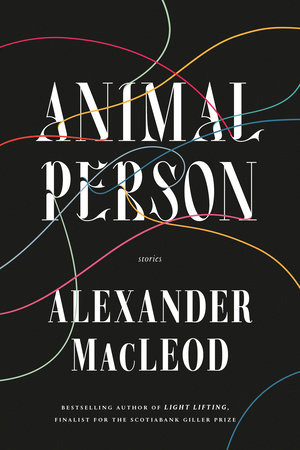
“The Slip ’N Slide waited. Its rubbery skin stretched down the hill, beading with water, and it could not be resisted.” This image from “The Dead Want,” the second story in Alexander MacLeod’s arresting, versatile, and wise sophomore short story collection, is characteristic; here, nonhuman figures serve as an uncanny mirror for the human experience, rendering characters puny and helpless yet more lovable for it. In Animal Person, rabbits, sharks, trampolines, tobacco farm equipment, and ATVs create an atmosphere of unease that lingers long after the book is closed. In the twelve years since publishing his first collection, Light Lifting, a finalist for the Scotiabank Giller Prize, MacLeod has published some of these stories in prestigious magazines like Granta and The New Yorker and won an O. Henry Prize for the book’s stunning opener, “Lagomorph.” Readers will find a writer building on his trusted themes (family, work, aging, animals, the outsider) and expanding these concerns with remarkable dexterity and rare range. Elegant and athletic, these eight stories deke expectations and repeatedly reinvent the possibilities of the short story form. Treat this book like a good shampoo: read, rinse, repeat.
—David Huebert has published two award-winning story collections. His debut novel, Oil People, will be published by McClelland and Stewart in 2024.
Holden After and Before: Love Letter for a Son Lost to Overdose by Tara McGuire
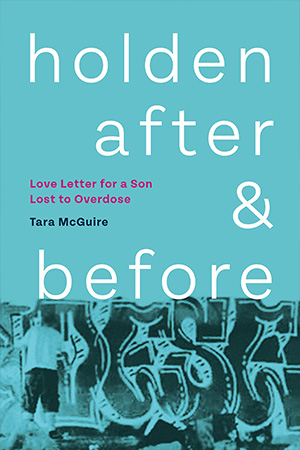
The best way for me to gauge how I feel about a book is to count up how many lines from it I jotted down on the pad of paper I keep next to my bed to read back to myself later. How many lines from the book I carried with me after, kicking them around behind my eyelids when I closed them. How many lines I read back to myself, over and over, until they morphed into memories, into keepsakes, like a lucky coin you slip into that little pocket in your jeans that sits under your right hip. I’ve been packing lines from Holden After and Before with me for three weeks now—and counting. Documenting the beautiful life and tragic opioid overdose of her son, a twenty-one-year-old graffiti artist, Tara McGuire uses fiction, supposition, and speculation to sculpt a loving memory of an artist, an addict, a boyfriend, a friend, and a son. This book will haunt you in the very best and most terrible of ways.
—Ivan Coyote is a storyteller and the author of thirteen books. Coyote was born and raised in, and recently moved home to, Whitehorse, Yukon.
Parasitic Oscillations by Madhur Anand
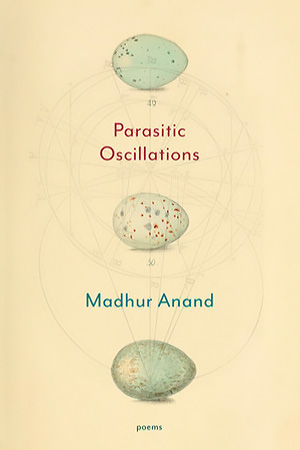
It’s not easy to walk around in that foggy place where science and art cross paths. There have been many times when I’ve read poetry or prose where the writer seems to have skimmed the Wikipedia entry on quantum mechanics just long enough to find grist for a metaphor. Sometimes it’s a good metaphor, but there’s still a kind of thinness to it. Parasitic Oscillations is the opposite of that. Madhur Anand is both a brilliant poet and an ecology professor, and the things she does with this collection—in style as well as structure—are things I’ve rarely, if ever, seen before: mutilated research, technological trickery, wonderful trips to the artistic hive mind. There are poems in this book that are rooted in grieving, both personal and world sized. To be able to pull off that kind of intimacy while also being this inventive, this out there—I can think of very few writers who have the skill and the spine. It’s one of those books that say something piercing about where we are as a species and what we’ve done.
—Omar El Akkad is an author and a journalist.
Helpmeet by Naben Ruthnum
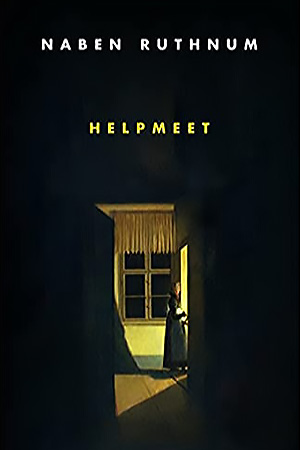
I read Naben Ruthnum’s unsettling gothic love story at the start of the year, in a single sitting, transfixed, pausing only to look out at the whirling snow. His lush and elegant prose drew me deep into the troubled and troubling marriage of Louise and Edward Wilks in upstate New York in the early 1900s—a loyal wife, a bitter, faithless husband, a vile disease that provokes a floridly grotesque transformation. How do you care for someone who is changing so horribly that they are rendered unrecognizable, perhaps even inhuman? Many months later, as another winter approaches, this slender story still lives with me. Ruthnum’s portrait of a spouse’s tender devotion in the face of unimaginable horror evokes the masters of the Edwardian weird tale but resonates across time—an evanescent bloom made more beautiful by the tinge of rot at its heart.
—David Demchuk’s most recent book is the horror novel/queer memoir RED X, published in 2021 by Strange Light.
The Sleeping Car Porter by Suzette Mayr
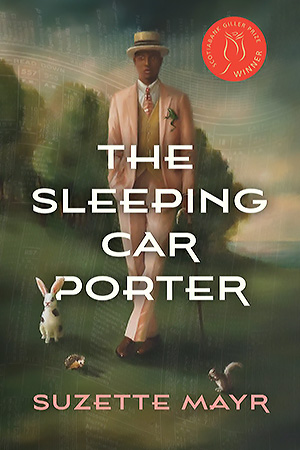
If you’re unfamiliar with the history of Black attendants on overnight trains, you should read Suzette Mayr’s recent novel, The Sleeping Car Porter. The Calgary author’s work hits all the right notes: Black history, wry delivery, and complex social dynamics, all wrapped up in a poignant drama. The narrative features R. T. Baxter, a Black porter trying to earn his way to dentistry school, his path to freedom. In 1929, being a porter was one of the few jobs a Black man in Canada could do, and it came with its challenges: emasculation, whimsically racist passengers and colleagues—“Find that smile, the bigger the better, and push the button, turn it on, but don’t Uncle Tom it. Don’t grin. Sing, dance, do magic tricks if they ask you. Maybe other things if the money’s worth it, but don’t Uncle Tom.” These and the sleepless grind persistently torment Baxter and, as his resolve crumbles, force him to face self-incriminating secrets. The fear of being fined or fired by the supervisor looms always, threatening to end his dream of becoming a dentist. A moving and engaging work, this novel deservedly won the 2022 Scotiabank Giller Prize.
—Bertrand Bickersteth was born in Sierra Leone and raised in Alberta. His first book of poems, The Response of Weed, won the Gerald Lampert Memorial Award.
Lost in the Valley of Death: A Story of Obsession and Danger in the Himalayas by Harley Rustad
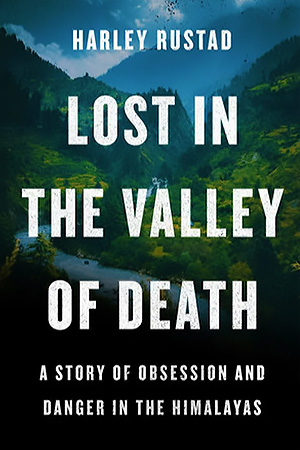
A young man walks into the wild to find the meaning of life—or at least of his own existence. It’s a familiar story, the plot of several blockbuster books and films, but Harley Rustad’s Lost in the Valley of Death is the best exegesis of the phenomenon yet. Rustad, a features editor at The Walrus, investigates what sent American traveller Justin Alexander Shetler into India’s Parvati Valley and why he never came back. In many ways, Shetler embodies the anxieties and paradoxes of our age: he performed his life for thousands of online followers yet was stalked by loneliness; he longed for authentic experiences yet staged himself having them; he tried on a dozen different lives yet none fit. Without romanticizing his protagonist but with deep compassion and reportorial rigour, Rustad explores the blurred lines between individual realization and selfishness, spiritual tourism and genuine seeking. The result is a nuanced page-turner that doubles as a cautionary tale, one that testifies to the true meaning of freedom: it’s not found in infinite choice or a rugged independence but in a commitment to something—anything—beyond the self.
—Kate Harris’s first book, the travel memoir Lands of Lost Borders, won the RBC Taylor Prize, the Kobo Emerging Writer Prize for Non-fiction, and the Edna Staebler Award for Creative Non-fiction.
In the City of Pigs by André Forget
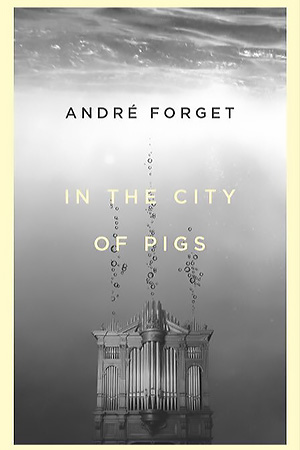
I am always looking for books by Canadian writers with hard literary chops and a desire to burst the seams of a parochially defined national literature. I was lucky to find all of this in André Forget’s Giller-longlisted In the City of Pigs, a novel that unfurls within your mind like a metapuzzle. The story follows Alexander Otkazov, who leaves the world of avant-garde music performance behind, only to become entangled with the moneyed interests financing it, in his capacity as a music journalist. His mettle is soon tested when he becomes romantically attached to a powerful impresario’s wife and is faced with a Sophoclean ethical dilemma. Forget massages the connections between capital, property, and the arts into a mesmeric picture of turpitude (or, as the author phrases it, into a “face that looks like a bowl of porridge an unwell person has spat into.”) A book that will recommend itself to the admirers of Mordecai Richler, André Alexis, and Carol Shields alike, Pigs’ version of the down-and-out narrator is a bitter tribute to the degradations of modernity.
—Jean Marc Ah-Sen is the author of Grand Menteur and In the Beggarly Style of Imitation. He lives in Toronto.
Hotline by Dimitri Nasrallah
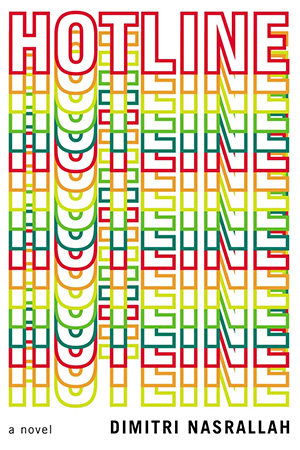
In Hotline, Muna Heddad, a single mother and new immigrant, makes her way in 1980s’ Montreal. Trained as a French teacher in Lebanon, Muna finds that she can only get steady work in her new country as an operator for a weight-loss hotline. Dimitri Nasrallah’s novel gives us glimpses into the myriad small indignities—today we might call them microaggressions—immigrants like Muna face. There’s something relentlessly contemporary about a newcomer trying to make her way in a place that feels its identity is under threat. Surely, hunting for affordable winter gear in an unfamiliar city whose denizens do not respect what you have to offer is the quintessential new Canadian experience. We feel the indignation Muna doesn’t let herself show and we feel her triumphs, both at work and in surviving the winter with her son. With its weird intimacy, the weight-loss hotline is itself an engrossing world. Nasrallah’s exploration of a migrant’s double consciousness is potent; so, too, is the disorienting feeling of knowing the place you are in can never comprehend the convulsive violence of the place you have left. This is a book about what haunts us and what keeps us going.
—Anna Mehler Paperny is the author of Hello I Want to Die Please Fix Me: Depression in the First Person.
The Next Age of Uncertainty: How the World Can Adapt to a Riskier Future by Stephen Poloz
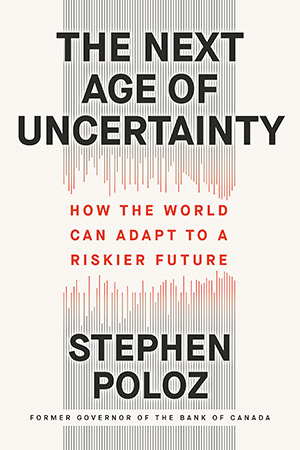
It’s not often that I would say a former central banker’s book is my favourite of the year, but it’s been no ordinary year. Inflation and interest rates and hardly-even-English terms like “quantitative easing” have leapt to the fore. The Next Age of Uncertainty, written before the current economic chaos, is both prescient and well timed. Former Bank of Canada governor Stephen Poloz offers accessible insights into how factors such as climate change and an aging population—with a dash of pandemic thrown in for good measure—are making the economy more volatile and the world more uncertain. There’s an anecdote where a flight attendant is unable to name the Bank of Canada governor or recognize Poloz. Those days are long gone—Poloz’s successor, Tiff Macklem, probably needs a security detail these days. Even in its little details, Poloz’s book is a stark reminder that the world is changing and that, to survive and thrive, we need to reexamine all that we’ve taken for granted.
—Ethan Lou is the author of Once a Bitcoin Miner and Field Notes from a Pandemic.
Hail, the Invisible Watchman by Alexandra Oliver
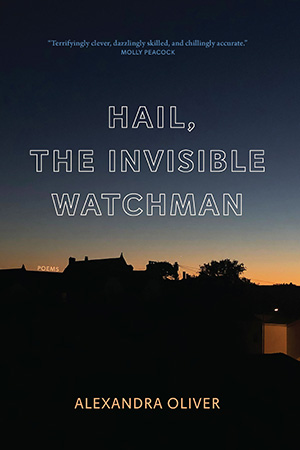
It’s harder to find contemporary life in poetry than it should be. If you want to ponder the vanishing sadness of dawn or feel the sting of mortality that comes from gazing at the moon, there’s a glut of stuff for you. But, if you want to read uncommonly good poems about former boyfriends or shopping for lipstick or running into an old schoolteacher—you know, the actual content of our everyday, harried lives—then you have few options. Luckily, Alexandra Oliver is one of them, and luckily, she had a new collection out this year: Hail, the Invisible Watchman. Master of the crisp rhyme with a Midas touch for phrasing, Oliver gives us the suburban mindset in rich, satirical precision, such as the councilwoman whose “selfie arm is spangled, / tan and toned and perfect as a pencil” or the doyenne whose smile has “the uniform crispness of linen.” Packed with cinematic and tactile writing, Hail, the Invisible Watchman shows us why Oliver is one of the best English-language poets in Canada.
—Carmine Starnino is editor-at-large at The Walrus. His most recent book is 2021’s The Essential John Glassco.





